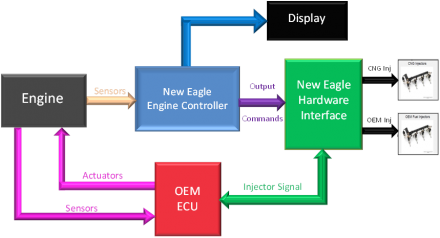Alternative Fuel Vehicles: Difference between revisions
No edit summary |
No edit summary |
||
| Line 17: | Line 17: | ||
== Bi-Fuel Gasoline Engines == | == Bi-Fuel Gasoline Engines == | ||
[[image:BiFuelSystemDiagram.png|frameless| | [[image:BiFuelSystemDiagram.png|frameless|440px |right]] | ||
New Eagle has verified a Bi-Fuel system design which utilizes a proven off-the-shelf embedded controller and custom electronics for use in the aftermarket. The system design involves rerouting the OEM injector signals through the New Eagle system so that they can be disabled in order to allow operation on the secondary fuel. A secondary fuel system is installed with an additional set of fuel injectors which the New Eagle controller will drive. | New Eagle has verified a Bi-Fuel system design which utilizes a proven off-the-shelf embedded controller and custom electronics for use in the aftermarket. The system design involves rerouting the OEM injector signals through the New Eagle system so that they can be disabled in order to allow operation on the secondary fuel. A secondary fuel system is installed with an additional set of fuel injectors which the New Eagle controller will drive. | ||
The introduction of an aftermarket component into an OEM control loop such as fueling will inevitably introduce gain and lag. The New Eagle system is designed to minimize the gain and lag introduced to the system by allowing on-cycle fueling adjustments and calibration of start of injection of the secondary fuel. The system can be calibrated to operate on one fuel or the other at different engine conditions. | The introduction of an aftermarket component into an OEM control loop such as fueling will inevitably introduce gain and lag. The New Eagle system is designed to minimize the gain and lag introduced to the system by allowing on-cycle fueling adjustments and calibration of start of injection of the secondary fuel. The system can be calibrated to operate on one fuel or the other at different engine conditions. | ||
Revision as of 20:48, 27 November 2013
Introduction
- CARB Certified heavy duty spark ignited engines
- Dual-Fuel - Alt Fuel + Diesel Engines
- Bi-Fuel - alt fuel + gasoline Engines
Capability Overview
New Eagle has experience in engine controls development for a range of alternative fuels applications. New Eagle has developed dedicated engine control software for a heavy duty propane application that is certified by CARB. New Eagle has supported concept validation efforts for hybrid fuel systems such as mixed fuel (dual fuel) diesel and bi-fuel gasoline applications. The New Eagle engineering team has experience with safety-critical system development, vehicle integration, communication protocol standards, and diagnostics.
Example Applications
Certified Heavy Duty Spark Ignited Engine
. .
Bi-Fuel Gasoline Engines

New Eagle has verified a Bi-Fuel system design which utilizes a proven off-the-shelf embedded controller and custom electronics for use in the aftermarket. The system design involves rerouting the OEM injector signals through the New Eagle system so that they can be disabled in order to allow operation on the secondary fuel. A secondary fuel system is installed with an additional set of fuel injectors which the New Eagle controller will drive.
The introduction of an aftermarket component into an OEM control loop such as fueling will inevitably introduce gain and lag. The New Eagle system is designed to minimize the gain and lag introduced to the system by allowing on-cycle fueling adjustments and calibration of start of injection of the secondary fuel. The system can be calibrated to operate on one fuel or the other at different engine conditions.